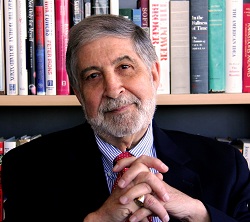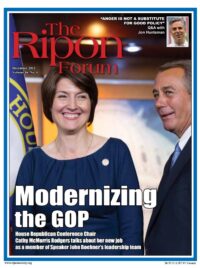
It has become convenient to blame the current dysfunction in Congress on the people themselves; much has been written about the fact that Americans have become less willing to actually engage in civil conversation with people who share political views that differ from their own. After all, if we have divided ourselves into warring camps, impervious to the arguments of those who disagree with us, why should we expect the people we elect to behave any differently?
There is some truth to that suggestion, just as there is truth to the claim that our political system suffers from inadequate civic education, a failure to teach critical thinking, busy lives that distract from thoughtful attention to issues, and even the constant flood of misinformation or vitriol that washes over us daily from radio, television, and the Internet. All of these are contributing factors. But the most significant problem is none of these: it is the fact that we have created – against the advice of our Founders – a political system that gives inordinate power to the most intransigent and ideological voters and washes out the most reasonable and thoughtful candidates for office.
Here’s how it works and why there are so few members of today’s Congress who are willing to work across the political aisle to reach the end-of-debate compromises that are necessary to formulate public policy in a nation of more than 300 million people.
In most states, party nominees are chosen in closed primaries or conventions in which only party members vote. With relatively low turnouts in primaries and limited participation in conventions, small and unrepresentative groups of activists, almost always more ideologically unyielding than the electorate at large, nominate those candidates who are most pure in championing a particular point of view.
For example, when Christine O’Donnell upset Mike Castle in the Delaware Republican primary for a U.S. Senate nomination, she received only 30,000 votes in a state of a million people. When Robert Bennett sought re-nomination to the Senate at a party convention in Utah, a state of three million, the votes of just 2,000 activists were sufficient to defeat him. Because 46 of the 50 states have “sore loser” laws that prohibit candidates’ names from appearing on the general election ballot if they lost in a campaign for their party’s nomination, neither Castle nor Bennett was one of the choices available to the statewide electorates that almost certainly would have sent them to the Senate.
We have created – against the advice of our Founders – a political system that gives inordinate power to the most intransigent and ideological voters and washes out the most reasonable and thoughtful candidates for office.
Coupled with party control of congressional redistricting, still the practice in most states, the result is a Congress that has little in common with the views of ordinary citizens. Once members are elected, they are dependent on party leaders for committee positions – sometimes awarded in return for promises to stick to the party line on major issues. It doesn’t need to be this way. We can have a Congress in which members reflect the views of the majority of their constituents and, once elected, have the freedom to study and evaluate the issues that come before them and to vote as conscience dictates.
Washington state and California have eliminated closed party primaries and now allow all voters to choose among all eligible candidates. They and nearly a dozen other states have taken away from parties the ability to shape congressional district lines to their advantage. In addition, Congress can be reshaped to operate with non-partisan staff, take from party leaders the ability to determine committee assignments, and mandate open procedures that will allow for a full consideration of alternative proposals. We can even follow the lead of both Canada and Great Britain and elect legislative leaders who function in a non-partisan way.
These reforms are not difficult, but they are essential. Today, too many members of Congress function as representatives of their political clubs, not as Americans in common, working together to shape solutions to fundamental problems – keeping our bridges from collapsing, paying the nation’s creditors, making sure our soldiers have the equipment they need.
There is plenty of room, and plenty of need, for vigorous debate (democracy depends on those debates), but at the end, we need legislators who are willing to sit down together and find the areas of compromise that keep our nation strong and our government functioning.
Mickey Edwards, a former member of the Republican leadership in Congress, is a vice president of the Aspen Institute and the author, most recently, of “The Parties Versus the People: How to Turn Republicans and Democrats into Americans.”




